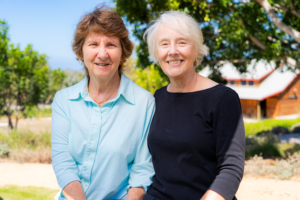Operationalizing Local Food: Goals, Actions, and Indicators for Alternative Food Systems
Niki Mazaroli, Program Officer in our Self-Sufficiency department, has been published in the academic journal, Agriculture and Human Values. The work was done under the direction of Professor David Cleveland, who’s research over the past five years has informed the food system localization efforts in Santa Barbara County.
Read the article.
Abstract:
Spatial localization, often demarcated by food miles, has emerged as the dominant theme in movements for more socially just and environmentally benign alternative food systems, especially in industrialized countries such as the United States. We analyze how an emphasis on spatial localization, combined with the difficulty of defining and measuring adequate indicators for alternative food systems, can challenge efforts by food system researchers, environmental writers, the engaged public, and advocacy groups wanting to contribute to alternative food systems, and facilitates exploitation by the mainstream players using “localwash” to maintain the status quo. New indicators are urgently needed because research shows that spatial localization in general and minimized food miles in particular are not adequate or even required for most of the goals of alternative food systems. Creating indicators to operationalize goals for alternative, local food systems requires asking the right questions to make sure indicators are not misleading us: What are the goals of alternative food systems? What actions and policies will most effectively achieve those goals? What is the potential of reducing food miles as an action and a policy for achieving goals? What are the best indicators for measuring progress toward goals? We discuss how these questions can be answered for a wide range of alternative food system goals via four categories according to the role of food miles reduction as an action and policy in promoting them: necessary and sufficient, necessary but not sufficient, potentially important, and potentially supportive.


 Black, Jewish and Queer. These three identities weave the fabric of who I am, but it took a long time to believe that they could exist together.
Black, Jewish and Queer. These three identities weave the fabric of who I am, but it took a long time to believe that they could exist together. Lee and Toni Leichtag established the Leichtag Foundation in 1991 following the sale of their business. Lee and Toni were lifelong entrepreneurs with a passion for innovation and for supporting talent. They believed that only with big risk comes big reward. Both born to families in poverty, Toni to a single mother, they strongly believed in helping those most in need and most vulnerable in our community. While they supported many causes, their strongest support was for young children and the elderly, two demographics who particularly lack voice in our society.
Lee and Toni Leichtag established the Leichtag Foundation in 1991 following the sale of their business. Lee and Toni were lifelong entrepreneurs with a passion for innovation and for supporting talent. They believed that only with big risk comes big reward. Both born to families in poverty, Toni to a single mother, they strongly believed in helping those most in need and most vulnerable in our community. While they supported many causes, their strongest support was for young children and the elderly, two demographics who particularly lack voice in our society. Lifelong Baltimoreans, Rabbi George and Alison Wielechowski and their sons, 11-year-old Lennon and 9-year-old Gideon, are more than pursuing the good life in Southern California. Having moved to San Diego more than three years ago, they are fulfilling a lifelong dream.
Lifelong Baltimoreans, Rabbi George and Alison Wielechowski and their sons, 11-year-old Lennon and 9-year-old Gideon, are more than pursuing the good life in Southern California. Having moved to San Diego more than three years ago, they are fulfilling a lifelong dream.






 You would think that as the executive director of San Diego LGBT Pride, Fernando Zweifach López Jr., who uses the pronoun they, has done all the coming out they possibly can. A queer, non-binary individual who has worked for many years on civil rights issues, López also speaks openly and often about their father’s family, Mexican-American migrant workers who tilled the fields of rural California.
You would think that as the executive director of San Diego LGBT Pride, Fernando Zweifach López Jr., who uses the pronoun they, has done all the coming out they possibly can. A queer, non-binary individual who has worked for many years on civil rights issues, López also speaks openly and often about their father’s family, Mexican-American migrant workers who tilled the fields of rural California. Stacie and Jeff Cook understand commitment. They live it.
Stacie and Jeff Cook understand commitment. They live it.
